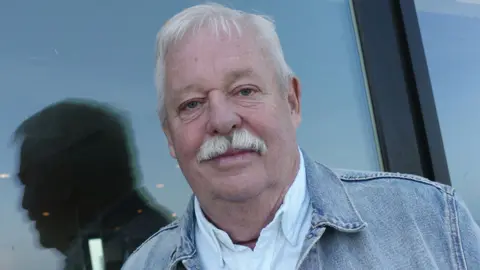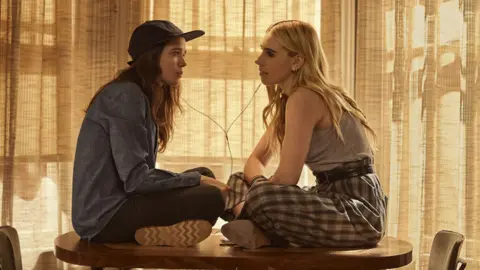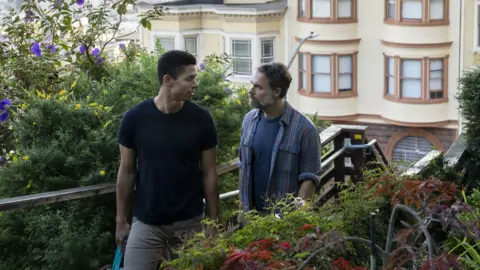Tales of the City author: 'Gay actors for gay roles'
More than 20 years since Armistead Maupin's Tales of the City books were first made into a series for UK TV, a new adaptation for global audiences begins this week with a 10-part Netflix revival.
In 1993, Channel 4 produced the first TV adaptation of the well-loved stories (Maupin has written 10) which follow a group of San Franciscans over several months in the 1970s. The stories have interwoven plots and interrelated characters, some of whom are LGBT.
The original series caused a stir when it eventually aired in the United States on PBS later that year because of its LGBT characters, scenes showing nudity and drug taking.
PBS was flooded with calls from the public, both before and after Tales of the City was screened, with many demanding the show be cancelled. And as the argument rumbled on there was a bomb threat in Chattanooga, Tennessee.
"When Tales of the City appeared in America in 1994, it was the first time Americans had seen two men kissing on broadcast television. It caused an uproar with certain right wing groups who petitioned Congress. They shut it down, essentially," says Maupin.
 Getty Images
Getty ImagesPBS went on to screen two versions of the show, one as produced and one edited to remove scenes such as two men in bed together.
But it didn't stop the protests from groups promoting family values who called it "gay propaganda" and "anti-family, anti-religious". The debate also went to the Senate in some states.
The series was nonetheless a huge ratings hit for PBS, and also won a legion of fans and much critical praise. PBS was spooked though and shied away from making the sequel, leading Maupin to say PBS had "caved" in.
Netflix's release will be the fourth TV adaptation of Maupin's books. Each series has taken up a different stage in Maupin's series. But this latest venture is its most diverse yet. The actors chosen to play the iconic roles were this time very important to the author, one of the leading names in queer literature.
"I just think that a gay actor can bring something special to the role from their own experience. I've always wanted a gay man to play Michael Tolliver, for instance, he's sort of my alter ego," says Maupin.
 Netflix
NetflixMichael's character is played by Murray Bartlett. Other cast members include Laura Linney, who has played the central character of Mary Ann Singleton in all series, and Olympia Dukakis (also in the show from the start) as Anna Madrigal. Ellen Page, Paul Gross and Josiah Victoria Garcia and Zosia Mamet also feature.
There is currently a heated debate within Hollywood about whether non-LGBT actors should be playing LGBT roles, especially when there is so much queer acting talent available to represent themselves.
According to industry insiders, several of these performers will be out of work, whilst their straight and cisgendered (meaning they identify with their birth sex)colleagues go to great lengths to perform their potentially perfect queer castings.
Maupin believes that many LGBT performers will stay silent about their sexuality, hoping to not get typecast or overlooked.
 Netflix
Netflix"We've got many more 'out' actors now, but not enough. There's still huge lies being told across the board, because agents demand that if they're gay actors, there's still an idea in Hollywood that the big stars can't be gay.
"And we do have four or five really big stars who are gay, and they've gone to great lengths to cover it up, getting wives and girlfriends.
"When you see Murray Bartlett, or Ellen Page, who plays Shauna Hawkins, you can you can feel the truth of what they're doing… In a way that you wouldn't if a straight actor was busy trying to distance himself or herself."
It isn't just diverse sexualities and genders that audiences can expect on their screens - the author also pushed for racial diversity too.
"When I wrote Tales of the City, 40 years ago, I was a little white boy straight out of the South and so too many of the people were white. For several of the characters in Tales, we've changed their racial component, because we wanted more black people in the show."
Younger generations of LGBT people may not be aware of Tales of the City existing prior to this Netflix series launching, but Maupin has been widely thanked by several generations of queer people for bringing their lives to the mainstream.
They thank him for making wider society aware of the community's existence and importance when not many others would.
"This has been a long struggle. There's still plenty of people that need to hear it, because they believe their church or their parents, or their repressive country about who they are.
"To know that I've told a story that has endured and people want to keep knowing about these people, that's the best a writer can ask for."
Tales of the City is on Netflix now.

Follow us on Facebook, on Twitter @BBCNewsEnts, or on Instagram at bbcnewsents. If you have a story suggestion email [email protected].
